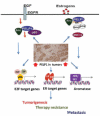PELP1: A novel therapeutic target for hormonal cancers
- PMID: 20014005
- PMCID: PMC2997573
- DOI: 10.1002/iub.287
PELP1: A novel therapeutic target for hormonal cancers
Abstract
Recent studies implicate that the estrogen receptor (ER) coregulator proline-, glutamic acid-, and leucine-rich protein (PELP) 1 as playing critical roles in ER-genomic, ER-nongenomic, and ER-signaling cross talk with growth factor signaling pathways. PELP1 expression is deregulated in hormonal cancers and recent studies further elucidated the molecular mechanisms by which PELP1 regulates hormone therapy response. Although PELP1 is important for normal functions of the ER, the possibility to target ER-PELP1 axis appears to be an effective strategy for preventing hormonal carcinogenesis and therapy resistance. Thus, PELP1 may be useful as prognostic marker for hormonal cancers and PELP1 signaling may be useful to generate targeted therapeutics to overcome hormonal therapy resistance.
Figures

References
-
- Green KA, Carroll JS. Oestrogen-receptor-mediated transcription and the influence of co-factors and chromatin state. Nat. Rev. Cancer. 2007;7:713–722. - PubMed
-
- Heldring N, Pike A, Andersson S, Matthews J, Cheng G, Hartman J, Tujague M, Strom A, Treuter E, Warner M, Gustafsson JA. Estrogen receptors: how do they signal and what are their targets. Physiol Rev. 2007;87:905–931. - PubMed
-
- Lewis-Wambi JS, Jordan VC. Treatment of Postmenopausal Breast Cancer with Selective Estrogen Receptor Modulators (SERMs) Breast Dis. 2005;24:93–105. - PubMed
-
- Song RX, Zhang Z, Santen RJ. Estrogen rapid action via protein complex formation involving ERalpha and Src. Trends Endocrinol. Metab. 2005;16:347–353. - PubMed
Publication types
MeSH terms
Substances
Grants and funding
LinkOut - more resources
Full Text Sources

